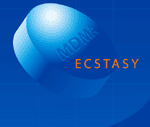
MDMA (or 3,4-methylenedioxymethamphetamine) is often called a "club drug" because people frequently take it at all-night dance parties ("raves"), bars, clubs, and concerts. Other club drugs include ketamine, GHB (gamma hydroxybutyrate), Rohypnol (flunitrazepam), and methamphetamine. People may take MDMA to have enough energy to keep dancing or partying all night or for a feeling of emotional warmth and a general sense of well-being. MDMA acts as both a stimulant and a hallucinogen. Unfortunately, users may not realize that MDMA may hurt them. In some cases, its abuse can be fatal.
MDMA is usually taken orally, in a pill, tablet, or capsule. It may also be crushed and snorted or injected. Each tablet contains between 60 and 120 milligrams of MDMA, plus other unknown "fillers."
The good news is that, since 2001, MDMA abuse had been slowly declining among American adolescents. The bad news is that the decline seems to have tapered off in 2005. According to the 2005 Monitoring the Future survey, annual prevalence rates of MDMA abuse among 8th-, 10th-, and 12th-grade students are 1.7, 2.6, and 3.0 percent, respectively-about one-half to two-thirds below the rates for 2001. The same study showed that more than 94 percent of 12th-graders had never even tried ecstasy. Fewer 8th-graders saw "great risk" in occasionally using MDMA, however, which means that 8th-graders may not understand the health risks of using MDMA as well as they should.
Used in combination with alcohol, MDMA - and many other drugs - can be even more harmful.
For most users, the effects of MDMA last 3 to 6 hours. But negative side effects can last for days.
MDMA is not a safe drug-even if taken only once in a while. It can change the way the brain functions, impairing the senses, memory, judgment, and coordination. Other side effects include:
MDMA speeds up heart rate and blood pressure and disrupts the brain's ability to regulate body temperature. Overheating to the point of "hyperthermia" can result. When this happens, abusers begin to sweat but can't cool off. Also, the "rave" atmosphere is hot and crowded, which doesn't help users stay cool. Treatment of hyperthermia requires prompt medical attention, as it can rapidly lead to muscle breakdown, which can in turn result in kidney failure.
There are no specific treatments for MDMA abuse. Cognitive behavioral interventions and support groups may be effective.
Someone using MDMA may experience the following:
You may notice that they own "rave" accessories, such as pacifiers and glow sticks.
[Back to top]